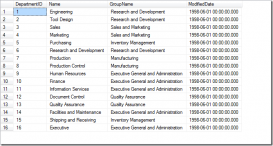SQL Server中新增加了XML.Modify()方法,分别为xml.modify(insert),xml.modify(delete),xml.modify(replace)对应XML的插入,删除和修改操作。
本文以下面XML为例,对三种DML进行说明:
declare
@XMLVar xml = '
<catalog>
<book category="ITPro">
<title>Windows Step By Step</title>
<author>Bill Zack</author>
<price>49.99</price>
</book>
<book category="Developer">
<title>Developing ADO .NET</title>
<author>Andrew Brust</author>
<price>39.93</price>
</book>
<book category="ITPro">
<title>Windows Cluster Server</title>
<author>Stephen Forte</author>
<price>59.99</price>
</book>
</catalog>
'
1.XML.Modify(Insert)语句介绍
A.利用as first,at last,before,after四个参数将元素插入指定的位置
set
@XMLVar.modify
(
'insert <first name="at first" /> as first into (/catalog[1]/book[1])'
)
set
@XMLVar.modify
(
'insert <last name="at last"/> as last into (/catalog[1]/book[1])'
)
set
@XMLVar.modify
(
'insert <before name="before"/> before (/catalog[1]/book[1]/author[1])'
)
set
@XMLVar.modify
(
'insert <after name="after"/> after (/catalog[1]/book[1]/author[1])'
)
SELECT
@XMLVar.query('/catalog[1]/book[1]'
);
结果集为:
<book category="ITPro"
>
<first name="at first"
/>
<title>Windows Step By Step</title>
<before name="before"
/>
<author>Bill Zack</author>
<after name="after"
/>
<price>49.99</price>
<last name="at last"
/>
</book>
B.将多个元素插入文档中
--方法一:利用变量进行插入
DECLARE @newFeatures xml;
SET @newFeatures = N'
<first>one element</first>
<second>second element</second>'
SET @XMLVar.modify('
)
insert sql:variable("@newFeatures")
into (/catalog[1]/book[1])'
--方法二:直接插入
set @XMLVar.modify('
)
insert (<first>one element</first>,<second>second element</second>)
into (/catalog[1]/book[1]/author[1])'
SELECT @XMLVar.query('/catalog[1]/book[1]'
);
结果集为:
1:
<
book
category
="ITPro"
>
2:
<
title
>
Windows Step By Step</
title
>
3:
<
author
>
Bill Zack
4:
<
first
>
one element</
first
>
5:
<
second
>
second element</
second
>
6:
</
author
>
7:
<
price
>
49.99</
price
>
8:
<
first
>
one element</
first
>
9:
<
second
>
second element</
second
>
10:
</
book
>
C.将属性插入文档中
--使用变量插入
declare @var nvarchar(10) = '变量插入'
set @XMLVar.modify(
'insert (attribute var {sql:variable("@var")})
)
into (/catalog[1]/book[1])'
--直接插入
set @XMLVar.modify(
'insert (attribute name {"直接插入"})
)
into (/catalog[1]/book[1]/title[1])'
--多值插入
set @XMLVar.modify(
'insert (attribute Id {"多值插入1"},attribute name {"多值插入2"})
)
into (/catalog[1]/book[1]/author[1])'
SELECT @XMLVar.query('/catalog[1]/book[1]'
);
结果集为:
1:
<book category="ITPro"
var="变量插入"
>
2:
<title name="直接插入"
>Windows Step By Step</title>
3:
<author Id="多值插入1"
name="多值插入2"
>Bill Zack</author>
4:
<price>49.99</price>
5:
</book>
D.插入文本节点
set
@XMLVar.modify
(
'insert text{"at first"} as first
)
into (/catalog[1]/book[1])'
SELECT
@XMLVar.query('/catalog[1]/book[1]'
);
结果集为:
1:
<
book
category
="ITPro"
>
2:
at first
3:
<
title
>
Windows Step By Step</
title
>
4:
<
author
>
Bill Zack</
author
>
5:
<
price
>
49.99</
price
>
6:
</
book
>
注意:插入本文同样具体 as first,as last,before,after四种选项,可以参考A中的使用方法
E.插入注释节点
set @XMLVar.modify(
'insert <!--插入评论-->
)
before (/catalog[1]/book[1]/title[1])'
SELECT @XMLVar.query('/catalog[1]/book[1]'
);
结果集为:
1:
<book category="ITPro"
>
2:
<!--插入评论-->
3:
<title>Windows Step By Step</title>
4:
<author>Bill Zack</author>
5:
<price>49.99</price>
6:
</book>
注意插入注释节点同样具体 as first,as last,before,after四种选项,可以参考A中的使用方法
F.插入处理指令
set @XMLVar.modify(
'insert <?Program "Instructions.exe" ?>
)
before (/catalog[1]/book[1]/title[1])'
SELECT @XMLVar.query('/catalog[1]/book[1]'
);
结果集为:
1: <bookcategory="ITPro">
2: <?Program"Instructions.exe"?>
3: <title>Windows Step By Step</title>
4: <author>Bill Zack</author>
5: <price>49.99</price>
6: </book>
注意插入处理指令同样具体 as first,as last,before,after四种选项,可以参考A中的使用方法
G.根据 if 条件语句进行插入
set @XMLVar.modify(
'insert
)
if (/catalog[1]/book[1]/title[2]) then
text{"this is a 1 step"}
else ( text{"this is a 2 step"} )
into (/catalog[1]/book[1]/price[1])'
SELECT @XMLVar.query('/catalog[1]/book[1]'
);
结果集为:
1: <book category="ITPro">
2: <title>Windows Step By Step</title>
3: <author>Bill Zack</author>
4: <price>49.99this isa 2 step</price>
5: </book>
2.XML.Modify(delete)语句介绍
--删除属性
set @XMLVar.modify('delete /catalog[1]/book[1]/@category')
--删除节点
set @XMLVar.modify('delete /catalog[1]/book[1]/title[1]')
--删除内容
set @XMLVar.modify('delete /catalog[1]/book[1]/author[1]/text()')
--全部删除
set @XMLVar.modify('delete /catalog[1]/book[2]')
SELECT @XMLVar.query('/catalog[1]');
结果集为:
1: <catalog>
2: <book>
3: <author />
4: <price>49.99</price>
5: </book>
6: <book category="ITPro">
7: <title>Windows Cluster Server</title>
8: <author>Stephen Forte</author>
9: <price>59.99</price>
10: </book>
11: </catalog>
3.XML.Modify(replace)语句介绍
--替换属性
set @XMLVar.modify('replace value of(/catalog[1]/book[1]/@category))
with ("替换属性")'
--替换内容
set @XMLVar.modify('replace value of(/catalog[1]/book[1]/author[1]/text()[1]))
with("替换内容")'
--条件替换
set @XMLVar.modify('replace value of (/catalog[1]/book[2]/@category))
with(
if(count(/catalog[1]/book)>4) then
"条件替换1"
else
"条件替换2")'
SELECT @XMLVar.query('/catalog[1]'
);
结果集为:
1: <catalog>
2: <bookcategory="替换属性">
3: <title>Windows Step By Step</title>
4: <author>替换内容</author>
5: <price>49.99</price>
6: </book>
7: <bookcategory="条件替换2">
8: <title>
Developing ADO .NET</title>
9:
<author>
Andrew Brust</author>
10: <price>39.93</price>
11: </book>
12: <bookcategory="ITPro">
13: <title>Windows Cluster Server</title>
14: <author>Stephen Forte</author>
15: <price>59.99</price>
16: </book>
17: </catalog>
SQL Server中的XML数据进行insert、update、delete
2020-06-27 16:50MSSQL教程网 Sql Server
SQL Server 2005/2008增加了对XML数据的支持,同时也新增了几种操作XML的方法,本文主要以SQL Server 2008为例介绍如何对XML数据进行insert、update、delete。
延伸 · 阅读
- 2022-03-11一篇文章了解c++中的new和delete
- 2022-03-07mysql中drop、truncate与delete的区别详析
- 2022-03-07C#操作XML文件步骤
- 2022-03-07Spring Xml装配Bean的思路详解
- 2022-03-06C#连接SQL Server的实现方法
- 2022-03-05Postgres中UPDATE更新语句源码分析
- Sql Server

SQL查询入门(上篇) 推荐收藏
SQL语言是一门简单易学却又功能强大的语言,它能让你快速上手并写出比较复杂的查询语句。 ...
- Sql Server

SQL server 2008 数据安全(备份和恢复数据库)
备份和恢复数据库对于数据库管理员来说是保证数据安全性的一项重要工作。SQL server 2008提供了高性能的备份和恢复功能,可以实现多种方式的数据库备份...
- Sql Server

SQL server 随机数函数
在SQL server中,有个随机函数rand(),有不少新手可能不知道存在这个函数,现在我就把这个函数的一些随机数生成技巧写出来,这是面向菜鸟的,老鸟请不要...
- Sql Server

SQLServer 数据库故障修复顶级技巧之一
SQL Server 2005 和 2008 有几个关于高可用性的选项,如日志传输、副本和数据库镜像。 ...
- Sql Server

针对Sqlserver大数据量插入速度慢或丢失数据的解决方法
这篇文章主要介绍了针对Sqlserver大数据量插入速度慢或丢失数据的解决方法,很有实用价值,需要的朋友可以参考下 ...
- Sql Server

sql的临时表使用小结
这篇文章主要介绍了sql的临时表使用小结,需要的朋友可以参考下 ...
- Sql Server

SQL查询的底层运行原理深入分析
这篇文章主要给大家介绍了关于SQL查询的底层运行原理,文中通过实例代码结束的非常详细,对大家学习或者使用SQL具有一定的参考学习价值,需要的朋友...
- Sql Server

SqlServer将查询结果转换为XML和JSON
这篇文章主要介绍了SqlServer将查询结果转换为XML和JSON的相关资料,需要的朋友可以参考下 ...










